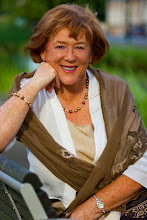I visited my mother today. I brought
flowers and touched her cheek. She is now younger than me by almost twenty
years – her forever-young face smiling from an oval photograph, the image as
fresh as the day it was placed on her gravestone.
The cemetery was full of people like
myself who were there to remember their mothers – and the purple
wrappings of a thousand bouquets fluttered like the wings of exotic birds, blown
off course on the cold, bitter wind.
Earlier, I had brunch with my family,
cooked by my son and his wife, a nosh-up that left us replete and convinced we
would not eat again for a week. I was pampered and waited upon, delighted to
share this day with those I love.
Later, walking between gravestones, I
reached out to my own mother, long dead and gone before her time. As I laid my flowers on her grave, the memories came in a stream, and were as vivid as yesterday.
I remembered her laughter and mischievous
sense of humour, the tricks she loved to play, the songs she sang ―for some reason they were always sad – and I would stand with my face to the wall so that no one would see me cry. I
remembered her scent, the colour of her eyes, the imprint of her feet in old
shoes, her admonishments followed by hugs, the ginger and apple bread she baked,
her unstinting efforts to keep our father (a seaman, and at sea more often than
he was at home) at the centre of her family. I remembered the letters she
wrote to him, simple messages of love and loneliness, a day-by-day account of her daily
life, asking his opinion on the smallest detail so that he would not feel
excluded from her decisions.
Mostly, I remembered her courage as
she faced the possibility of her death. The
vibrant bandana she wore as she waved me from her hospital ward and promised she would see me soon. That was not to be – and the memories that came afterwards had no
place in my mind on a day like today.
My mother died on the cusp of change.
Her Ireland was an innocent place, pious, respectful, obedient, hidden and
controlling. The women’s movement was beginning to shout, the Troubles to
explode, and brutal secrets to be exposed. She was never to have her faith
challenged by scandal and revelation, her nationality distorted by those who
maimed and killed in her name, to witness confident women demanding the right
to equality, to dissect sacred cows and topple the unworthy from their pedestals.
She was never to know her grandchildren.
She missed much – and was spared
much. Such is the balance of life and death. She walked this way for a short while yet the memory of her
presence lives deep within the hearts of her four children. Like all memories, ours are fragmented, selective and personal - yet on Mother's Day they shine with a particular radiance that comes when love and loss combine. Today, in Glasnevin Cemetery, I saw those memories reflected on the faces to those
who walked past me on their way to pay homage with flowers to the mothers they
will never forget.


No comments:
Post a Comment